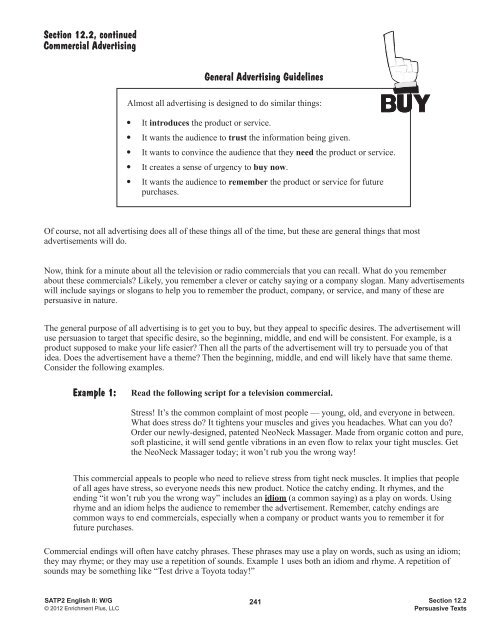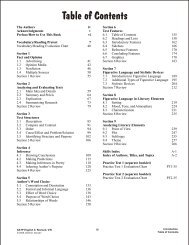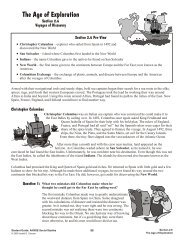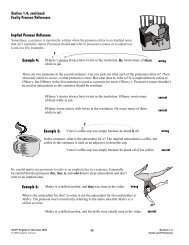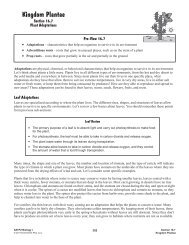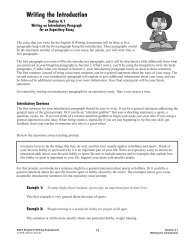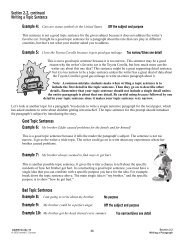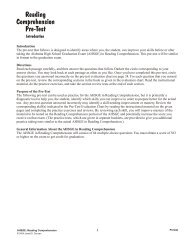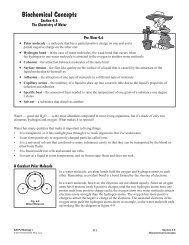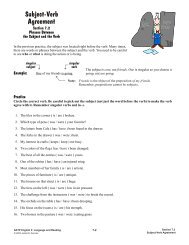Writing/Grammar Pre-Test - Enrichment Plus
Writing/Grammar Pre-Test - Enrichment Plus
Writing/Grammar Pre-Test - Enrichment Plus
You also want an ePaper? Increase the reach of your titles
YUMPU automatically turns print PDFs into web optimized ePapers that Google loves.
Section 12.2, continued<br />
Commercial Advertising<br />
General Advertising Guidelines<br />
Almost all advertising is designed to do similar things:<br />
! It introduces the product or service.<br />
! It wants the audience to trust the information being given.<br />
! It wants to convince the audience that they need the product or service.<br />
! It creates a sense of urgency to buy now.<br />
! It wants the audience to remember the product or service for future<br />
purchases.<br />
Of course, not all advertising does all of these things all of the time, but these are general things that most<br />
advertisements will do.<br />
Now, think for a minute about all the television or radio commercials that you can recall. What do you remember<br />
about these commercials? Likely, you remember a clever or catchy saying or a company slogan. Many advertisements<br />
will include sayings or slogans to help you to remember the product, company, or service, and many of these are<br />
persuasive in nature.<br />
The general purpose of all advertising is to get you to buy, but they appeal to specific desires. The advertisement will<br />
use persuasion to target that specific desire, so the beginning, middle, and end will be consistent. For example, is a<br />
product supposed to make your life easier? Then all the parts of the advertisement will try to persuade you of that<br />
idea. Does the advertisement have a theme? Then the beginning, middle, and end will likely have that same theme.<br />
Consider the following examples.<br />
Example 1:<br />
Read the following script for a television commercial.<br />
Stress! It’s the common complaint of most people — young, old, and everyone in between.<br />
What does stress do? It tightens your muscles and gives you headaches. What can you do?<br />
Order our newly-designed, patented NeoNeck Massager. Made from organic cotton and pure,<br />
soft plasticine, it will send gentle vibrations in an even flow to relax your tight muscles. Get<br />
the NeoNeck Massager today; it won’t rub you the wrong way!<br />
This commercial appeals to people who need to relieve stress from tight neck muscles. It implies that people<br />
of all ages have stress, so everyone needs this new product. Notice the catchy ending. It rhymes, and the<br />
ending “it won’t rub you the wrong way” includes an idiom (a common saying) as a play on words. Using<br />
rhyme and an idiom helps the audience to remember the advertisement. Remember, catchy endings are<br />
common ways to end commercials, especially when a company or product wants you to remember it for<br />
future purchases.<br />
Commercial endings will often have catchy phrases. These phrases may use a play on words, such as using an idiom;<br />
they may rhyme; or they may use a repetition of sounds. Example 1 uses both an idiom and rhyme. A repetition of<br />
sounds may be something like “<strong>Test</strong> drive a Toyota today!”<br />
SATP2 English II: W/G<br />
© 2012 <strong>Enrichment</strong> <strong>Plus</strong>, LLC<br />
241<br />
Section 12.2<br />
Persuasive Texts


